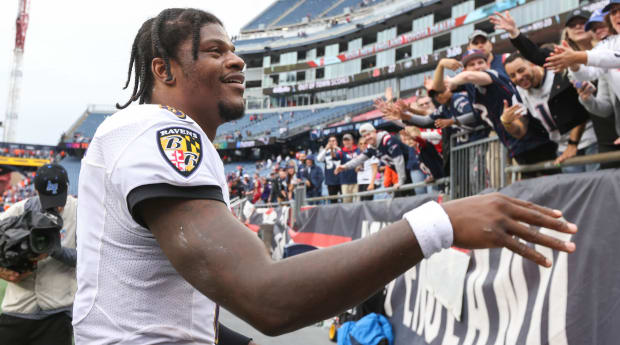I’m trying to be less hyperbolic these days, so with the news that Lamar Jackson has agreed to a five-year deal with the Ravens worth $260 million in a “traditional” nonguaranteed structure, I wonder whether we’re allowed to simply say: Good job everyone.
Here’s the thing: Jackson’s quest for a fully guaranteed contract as a completely self-represented player isn’t going to change a whole lot. It certainly isn’t going to change the absolutely gross underbelly of the league’s information trade, in which teams, reporters and agents exchange one-sided tidbits in a never-ending war for optical supremacy, even though a lot of us in the media have come to the end of this saga with egg on our faces (here’s a regrettable track from the Conor Orr vault from a mere seven weeks ago). It probably isn’t going to change the way players advocate for themselves at the bargaining table, because there were parts of this melodrama that were undoubtedly harmful to Jackson’s brand and showed just how scary life without an agent can be. It’s definitely not going to change the number of players who shoot for the moon and try to outdo the Deshaun Watson contract because, as we’ve hopefully realized by now, only one team is that wholly desperate and lacking in self respect.

Paul Rutherford/USA TODAY Sports
So, what can we learn from all this? Personally, Jackson taught me—and hopefully others—to treat a self-represented negotiation the way we would treat any other negotiation, and not to assume that, just because a player does not have the services of a top-flight agent, doesn’t mean he’s overmatched. In that same vein, just because a player doesn’t get exactly what he wanted doesn’t make him a failure as his own agent.
Let’s unpack these one by one. When I first got the sense the tenor of the Jackson situation was changing, one smart agent said to me: You know how these things go, people yell and scream and ultimately we come to a deal. That stuck with me. In the weeks leading up to that moment, I had treated Jackson vs. Baltimore’s front office unlike any other negotiation we’ve seen in recent years because it was billed as such. But what if it wasn’t that different? What if Jackson, like Professional Agent X and Professional Agent Y understood that a little social media chaos was an avenue toward forced progress? I wouldn’t characterize this negotiation as tidy by any stretch, but there’s no doubt we’ve seen bigger tire fires when it comes to players and teams tap dancing around the bargaining table.
Next, I think we ought to be careful about suggesting that Jackson lost the proceedings because he ended up accepting a traditionally structured deal. Jackson, as he tweeted himself a few weeks back, got Baltimore to something of a contractual 1-yard line on a fully guaranteed deal. He was forcing the team down that avenue. And, who knows? Perhaps the progress he made on a fully guaranteed deal ended up laying the groundwork for the deal he signed Thursday, which makes him the highest-paid player in NFL history. Every single NFL player who has ever done a contract has finished that process believing he left something on the table. Every team that has ever done a contract in professional sports always believes it gave away too much.
Jackson is making more per season than Jalen Hurts. Hurts is healthier than Jackson, younger than Jackson, physically sturdier than Jackson, has more playoff wins than Jackson, will end his career as a more accurate passer than Jackson and has more Super Bowl appearances. I’m not saying Hurts is better, but if you are formulating the basis for a long-term deal, wouldn’t you value someone like Hurts more? And didn’t Jackson do a little bit better for himself, even if he was ultimately closer to free agency?
Not everything has to be definitively the best or the most important Football Thing, even if it seems at the outset that it might yield a great deal of importance. But, it can all be part of a massive learning process for us covering the sport, and for teams and for players hoping to do right by themselves financially. In that way, if we were to put a superlative on the Jackson negotiation, we might call it the most useful exercise in recent memory. That is far less sexy than saying Jackson changed the game or Baltimore dunked on Jackson Greg Ostertag–style. However, it’s the actual truth, which, after months of hearing that Jackson was delusional and Baltimore was preparing to draft a quarterback, is refreshing to hear sometimes.







